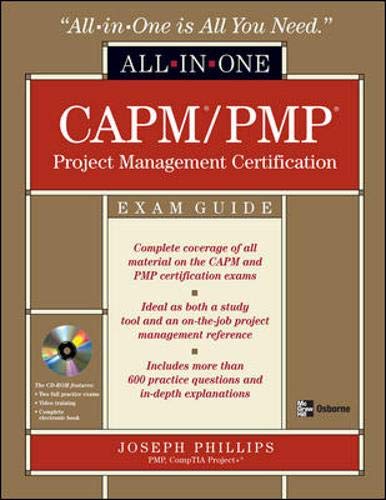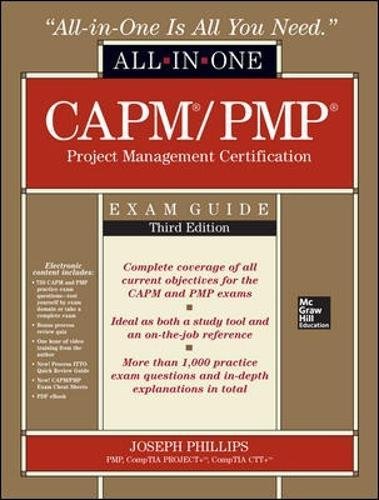(Part 2) Top products from r/projectmanagement
We found 20 product mentions on r/projectmanagement. We ranked the 56 resulting products by number of redditors who mentioned them. Here are the products ranked 21-40. You can also go back to the previous section.
22. Project Management, Denial, and the Death Zone: Lessons from Everest and Antarctica
Sentiment score: 1
Number of reviews: 1
 Show Reddit reviews
Show Reddit reviews23. Peopleware: Productive Projects and Teams (3rd Edition)
Sentiment score: 0
Number of reviews: 1
Addison-Wesley Professional
 Show Reddit reviews
Show Reddit reviews24. Executive Presence: The Missing Link Between Merit and Success
Sentiment score: 1
Number of reviews: 1
Executive Presence The Missing Link Between Merit and Success
 Show Reddit reviews
Show Reddit reviews25. CAPM/PMP Project Management All-in-One Exam Guide
Sentiment score: 0
Number of reviews: 1
 Show Reddit reviews
Show Reddit reviews26. CAPM/PMP Project Management Certification All-In-One Exam Guide, Third Edition
Sentiment score: 1
Number of reviews: 1
Used Book in Good Condition
 Show Reddit reviews
Show Reddit reviews27. Managing Successful Projects with PRINCE2 2009 Edition Manual
Sentiment score: 1
Number of reviews: 1
NewMint ConditionDispatch same day for order received before 12 noonGuaranteed packagingNo quibbles returns
 Show Reddit reviews
Show Reddit reviews28. Agile Estimating and Planning
Sentiment score: 1
Number of reviews: 1
Prentice Hall
 Show Reddit reviews
Show Reddit reviews29. The Mind and Heart of the Negotiator (5th Edition)
Sentiment score: 1
Number of reviews: 1
Used Book in Good Condition
 Show Reddit reviews
Show Reddit reviews30. Getting Things Done: The Art of Stress-Free Productivity
Sentiment score: 0
Number of reviews: 1
Great product!
 Show Reddit reviews
Show Reddit reviews31. The Checklist Manifesto: How to Get Things Right
Sentiment score: 1
Number of reviews: 1
The Checklist Manifesto How to Get Things Right
 Show Reddit reviews
Show Reddit reviews32. Succeeding with Agile: Software Development Using Scrum
Sentiment score: 1
Number of reviews: 1
 Show Reddit reviews
Show Reddit reviews33. Fundamentals of Project Management (WorkSmart)
Sentiment score: 1
Number of reviews: 1
 Show Reddit reviews
Show Reddit reviews34. Fierce Conversations: Achieving Success at Work and in Life One Conversation at a Time
Sentiment score: 1
Number of reviews: 1
The master teacher of positive change through powerful communication, Susan Scott wants you to succeed.
 Show Reddit reviews
Show Reddit reviews36. Effective Project Management: Traditional, Agile, Extreme
Sentiment score: 1
Number of reviews: 1
NewMint ConditionDispatch same day for order received before 12 noonGuaranteed packagingNo quibbles returns
 Show Reddit reviews
Show Reddit reviews38. Working with Emotional Intelligence
Sentiment score: 1
Number of reviews: 1
Bantam Books
 Show Reddit reviews
Show Reddit reviews




I think it's possible to communicate without rapport (e.g., documentation, plans, emails). That said, in a team environment, this will only get you so far. Rapport is often what determines how/if people listen to you and how they're geared to respond. I think you're quite right to call it out as its own competency.
IME, the most effective PMs (at least in terms of building relationships) have been:
Some people are naturals at all of it, due to biology and/or nurture. If you're not, you can try to learn new behaviors. It's a non-trivial effort, of course: in some cases, it might mean changing deeply ingrained communication patterns. As a first step, becoming conscious of the ways you're not being the list above can help you focus on what you want to change.
Here are a few related reads that I've learned from:
Hope this helps!
Hi skunk,
Since everyone is remaining quiet I might as well give this a shot. I'm from a technical background but currently studying PM in my spare time in the hope that I can progress in this direction within my industry.
PMP
It seems like the global standard is the PMP with PMI which requires:
> A secondary degree (high school diploma, associate’s degree, or the global equivalent) with at least five years of project management experience, with 7,500 hours leading and directing projects and 35 hours of project management education.
> OR
> A four-year degree (bachelor’s degree or the global equivalent) and at least three years of project management experience, with 4,500 hours leading and directing projects and 35 hours of project management education.
I'm currently studying towards this. I've taken recommendations from this subreddit (and /r/pmp) and bought:
and
In order to obtain the required 35 contact hours, I bought one of several cheap Groupons for $99. I'm not going to link the course because I don't necessarily recommend it - it should be easy enough to find and people have linked to these in previous posts. It doesn't really matter anyway because it's just so I can "tick that box", as I've learnt everything I need to know from the books.
The exam however will have to be sat in person. I have yet to do this so can't give you any pointers.
CAPM
If you don't match the above criteria, you can always opt for the lower qualification of CAPM (also with PMI) and work your way up.
For this I reccommend CAPM/PMP Project Management Certification, Third Edition and the previously mentioned online course.
Please note that you can potentially pitch anything as a project in the right light, even washing the dishes. Aim high and try to get the hours for PMP if possible.
PRINCE2 & SIX SIGMA
What else? Well, if I'm successful with the PMP and still enjoy PM after the blood, sweat and tears, I'm looking at these two qualifications.
I've already added a few books to my Amazon wishlist but have yet to seriously look into these with enough detail to commit.
I know that the exam for the PRINCE2 foundation level (and possibly practitioner level?) can be sat online with a webcam.
Six Sigma I know very little about except that several colleagues have mentioned it and my industry takes it seriously. However, I don't believe you can do these Six Sigma "belts" online.
Sorry for the serious wall of text but I just thought I'd share everything I know about PM accreditation. This isn't a comprehensive list but I'm planning on doing 90% online so I'm in a similar situation to yourself.
I would be grateful for any feedback myself from experienced PMs on my plans going forward.
Congrats on your promotion!
You might want to check out this book called “Executive Presence.” (Here’s the link on Amazon.) It focuses a lot on helping those who may not have the qualities or appearance of stereotypical exec exude the gravitas and confidence of a capable leader. Hopefully it’ll help you "establish yourself as The Boss.”
And actually, the company I work for has a blog with some posts written for new project managers that covers the basics. There’s a glossary of project management terms, an overview of common methodologies, a guide to project risk, and an introduction to using Gantt charts. I hope you find the information useful, and good luck!
If you're interested in Scrum (it's not an acronym) then an easy way to get started is to take training as a CSM (Certified Scrum Master). It's a 2-day course with a fairly easy multiple-choice exam.
If you're already a Product Manager, you could also look at the CSPO (Certified Scrum Product Owner) which will help you understand the differences in the way requirements are treated.
Scrum isn't the be-all and end-all of Agile methods, so do keep your mind open after the training! But it will help you to get your foot in the door.
After that, try looking for local Agile or Scrum groups; most big cities have them. Look out for Agile conferences too; even if you can't make it, a lot of them post the talks online.
If you do end up as a PM and you're struggling to understand something, don't be afraid to hire an Agile Coach for a few days. They'll help to mentor you, explain how Agile works, and fine-tune your processes.
The most important thing to remember about Agile methods is that they're there to help handle uncertainty. For anything you do that's new, and you've never done before, it's useful to make discoveries early rather than later and to get feedback quickly on those discoveries. In Waterfall we made sure we we're getting it right. In Agile, we assume we can't know everything up front and will inevitably get some of it wrong.
I'd also be remiss if I didn't mention Kanban, which is related to Agile and originally derived from the Lean techniques used at Toyota, and Cynefin (my blog, the Wikipedia page is also good). Mike Cohn's books are a pretty good first stop for basic Scrum, but Kanban and Cynefin will help you to see beyond that.
Finally, if you get stuck, http://pm.stackexchange.com is your friend. You can also shout out on Twitter; there's always people willing to help and pass you links and ideas.
(Oh, and don't worry too much about the formality. I work as a Lean / Kanban and Agile consultant, have no formal qualifications in it, and am internationally recognized. Doing it and having the metrics and stories to show that you've done it is more important than a qualification.)
I wouldn't say that budgeting is horrible in agile. Agile simplifies budgeting into iteration costs, and then estimates feature sets across iterations. In a very simplified example, if:
Where agile shines regarding scheduling is that the features are developed in the order of product manager / user value - and that value is recognized periodically with interim working product releases. This allows you to realize incoming cash flows earlier than a standard waterfall approach.
Where a scheduler would shine in Agile is in the statistical weighting and ordering of feature priority - not necessarily in the estimation of duration of each Feature / User Story. I highly recommend [Agile Estimating & Planning] (http://www.amazon.com/Agile-Estimating-Planning-Mike-Cohn/dp/0131479415) by Mike Cohn. IMO - the real trick to Agile is the proper ordering of development. If you hash that, you lose the early cash realization, and you can end up with a product that does not meet requirements as you fail to deliver core features before you run out of time/money.
I just use Excel, the world's most flexible tiny database management system. Work item, due date, assigned to, done date. If the checklist needs other columns, like checked by, it's easy to add them.
Have you read The Checklist Manifesto, by Atul Gawande?
Working with emotional intelligence: https://www.amazon.com/Working-Emotional-Intelligence-Daniel-Goleman/dp/0553378589
and
Mind and heart of the Negotiator :https://www.amazon.com/Mind-Heart-Negotiator-5th/dp/0132543869
Before transitioning into my current PM role I worked for a PR company. The CEO strongly recommended this book for general writing. It's not tech-focused, more general purpose but still a great resource.
http://www.amazon.com/Writing-Well-30th-Anniversary-Edition/dp/0060891548
Yes. This was a part of my curriculum. http://www.amazon.com/Effective-Project-Management-Traditional-Extreme/dp/0470423676
Its a good read. Not nearly as dry as the PMBOK. Much better explanations.
This one is pretty good https://www.amazon.com/Fundamentals-Project-Management-WorkSmart-Heagney/dp/0814417485
I recommend:
Project Management, Denial, and the Death Zone: Lessons from Everest and Antarctica https://www.amazon.ca/dp/1604271191/ref=cm_sw_r_cp_apa_T4OCAbA4GPPH7
It's a great book amd got me interested in risk management.
Evernote. Been religious for years now. I liked the book Getting Things Done and I built that system into Evernote.
Easily this one: http://www.amazon.com/gp/aw/d/0071487484
Take a look at the IIBA (International Institute of Business Analysis) and pick up Wiegers' book on Software Requirements.
I haven't read either of these books so I can't vouch for them personally, but my understanding is that Peopleware and Mythical Man Month are classics.